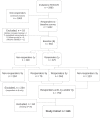Long-Term Change and Predictors of Change in Physical and Mental Function after Rehabilitation: A Multi-Centre Study
- PMID: 36601734
- PMCID: PMC9837623
- DOI: 10.2340/jrm.v55.2809
Long-Term Change and Predictors of Change in Physical and Mental Function after Rehabilitation: A Multi-Centre Study
Abstract
Objective: To investigate changes and predictors of change in physical and mental function over a 3-year period after rehabilitation.
Design: Prospective cohort.
Participants: Patients, across diseases, living in western Norway, accepted for somatic specialized interprofessional rehabilitation (n = 984).
Methods: Physical and mental function were assessed at admittance (baseline), and after 1 and 3 years using the Medical Outcome Study Short Form 36 (SF-36). Associations between changes in SF-36 component summary scores and sense of coherence, pain, disease group (musculoskeletal, neoplasm, cardiovascular, neurological, other), exercise habits and demographic variables were analysed using linear mixed modelling.
Results: In the total group, mean (standard deviation) physical component summary scores improved by 2.9 (8.4) and 3.4 (9.3) points at 1 and 3 years, respectively. Mental component summary scores improved by 2.1 (9.7) and 1.6 (10.8) points. Improvement in physical component summary was significantly greater for patients with higher sense of coherence (b = 0.09, p = 0.001) and for the neoplasm disease group (b = 2.13, p = 0.046). Improvement in mental component summary was significantly greater for patients with low sense of coherence (b = -0.13, p = < 0.001) and higher level of education (b = 3.02, p = 0.0302). Interaction with age (physical component summary: b = 0.22, p = 0.039/mental component summary b = 0.51, p = 0.006) indicated larger effect at 1 year than at 3 years.
Conclusion: Physical and mental function improved in the total study group over the 3-year period. Sense of coherence at baseline was associated with improved physical and mental function, suggesting that coping resources are important in rehabilitation.
Conflict of interest statement
Figures




References
-
- Stucki G, Bickenbach J. 1.1 Basic concepts, definitions and models. J Int Soc Phys Rehabil Med 2019; 2: S1 8–12.
Publication types
MeSH terms
LinkOut - more resources
Full Text Sources

